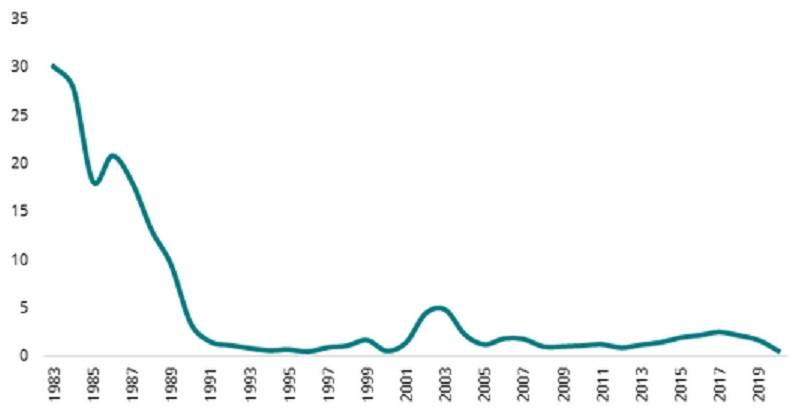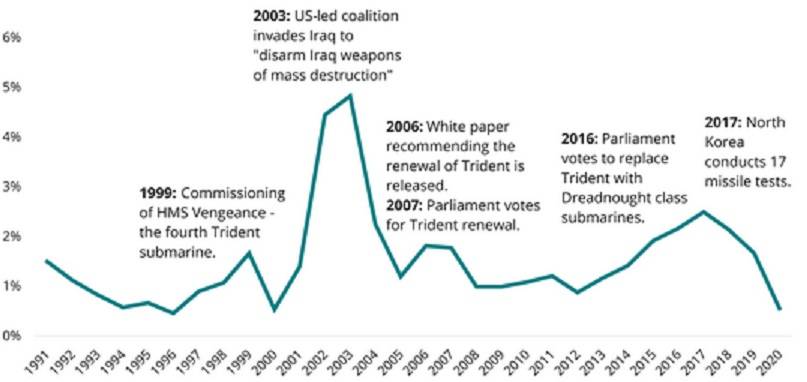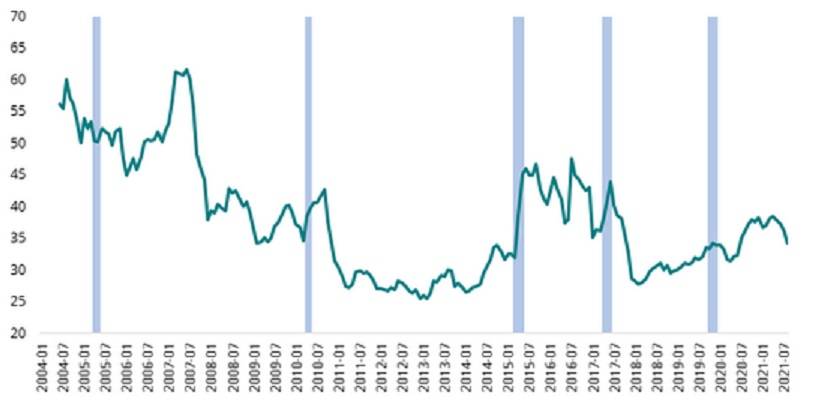Forty years on from the Greenham Common protests, do the Brits still care about nuclear weapons?
In September 1981, in the midst of the Cold War and one year after the UK began the Trident programme, 36 women chained themselves to the fences of RAF Greenham Common to protest against the storing of 96 American nuclear missiles at the site in Berkshire. This heralded the start of the ‘Greenham Common Women’s Peace Camp’ – an activist presence at the base that would last for nearly 20 years. This anti-nuclear weapons protest galvanised the British peace movement in the early-1980s. At its zenith, in 1983, 70,000 women encircled the Greenham Common site in a 14-mile-long human chain. The activists also had the public on side, with 59% of Britons opposed to the basing of U.S. nuclear missiles in the UK in the autumn of 1981. But, four decades after the Greenham Common peace protests began, do the British public still care about nuclear weapons?
On the face of it, the British public seem to overwhelmingly support the retention of a UK deterrent. In the 1980s, this was particularly true – the Labour Party’s support for unilateral disarmament in the 1983 and 1987 elections led to historic losses. Recent surveys also consistently show that the majority of UK adults support the retention of a nuclear deterrent, with a YouGov survey taken in April 2021 finding that 57% of respondents wanted the UK to retain some form of nuclear deterrent, with only 22% wanting complete disarmament. Even former-Labour Party leader Jeremy Corbyn, a lifelong nuclear disarmament activist and vice-President of the Campaign for Nuclear Disarmament (CND), felt obliged to retain the Labour Party’s pro-Trident position for fear of electoral backlash.
However, the debate about the UK public’s attitudes to the nuclear deterrent often ignores the significance of issue salience – the reality is that people simply don’t see nuclear weapons as being as important an issue as they used to. In 1983 and 1987, the years in which the pro-disarmament Labour Party were electorally shellacked, 30.1% and 18.1% of UK adults rated nuclear weapons as one of the most important issues facing the country in the Ipsos-MORI ‘Issues Index’ surveys respectively. However, by 1991 – when the Cold War was over and RAF Greenham Common had been disarmed – this fell to a meagre 1.5%. It has remained thereabouts ever since. Between 1991 and 2020, the average annual proportion of UK adults placing nuclear weapons amongst the most important issues facing the country was 1.53%.
Annual average of the percentage of British adults rating nuclear weapons as an “important issue facing Britain today” in Ipsos-MORI ‘Issues Index’ surveys between 1983 and 2020.

This is not to say that salience is static. Events can increase the perceived importance of nuclear weapons issues to the UK population. The most significant surge in salience came in 2002/2003, in the aftermath of the 9/11 attacks and during the 2003 invasion of Iraq – justified, in large part, by the need to dismantle Iraq’s supposed WMD arsenal. However, even at the peak in 2003, fewer than 5% of Britons saw nuclear weapons issues as important.
More recently, slight upticks in the salience of nuclear weapons issues have coincided with Parliamentary votes, such as in 2007 and 2016 when Trident renewal was voted on. Events such as the North Korean nuclear and missile tests during 2016 and 2017 could also be a driver of increased concern about nuclear weapons, given that nearly 40% of Britons thought that a war between the United States and North Korea was a likely prospect in late 2017.
Annual average of the percentage of British adults rating nuclear weapons as an “important issue facing Britain today” in Ipsos-MORI ‘Issues Index’ surveys between 1991 and 2020.

On top of Parliamentary votes and international events, general elections are another factor that tend to increase public interest in nuclear weapons. Google Trends data shows how Google searches for “Trident” tend to increase during election campaigns. This was particularly true in the 2015 election, when during the campaign then-Defence Secretary Michael Fallon accused the Labour Party of having plans to scrap Trident. It is notable that, during the most recent election in 2019, Google Trends registered no significant increase in interest in Trident, a finding that chimes with the Ipsos-MORI data, suggesting that the salience of nuclear weapons issues is continuing to decline.
Moving average of UK Google search volumes for “Trident” between January 2004 and July 2021, with shaded areas denoting general election campaigns.

Greenham Common Women’s Peace Camp lasted for 19 years and disbanded in2000 – a year in which a mere half a percent of Britons saw nuclear weapons as an important issue. With the nuclear weapons removed in 1991 and the RAF base decommissioned in 1997, the site once home to 96 cruise missiles pointed at the Soviet Union is now used for filming Beyonce music videos and Star Wars films. Since the end of the Cold War, such matters have occupied little space in the national conversation, despite re-emerging as a topic of relative importance periodically. Overall, however, it appears that the British public simply don’t care about nuclear weapons issues anymore.
Gideon Coolin has recently completed an internship with the Proliferation and Nuclear Policy programme at RUSI. He is currently a third year International Development undergraduate at King’s College London.
